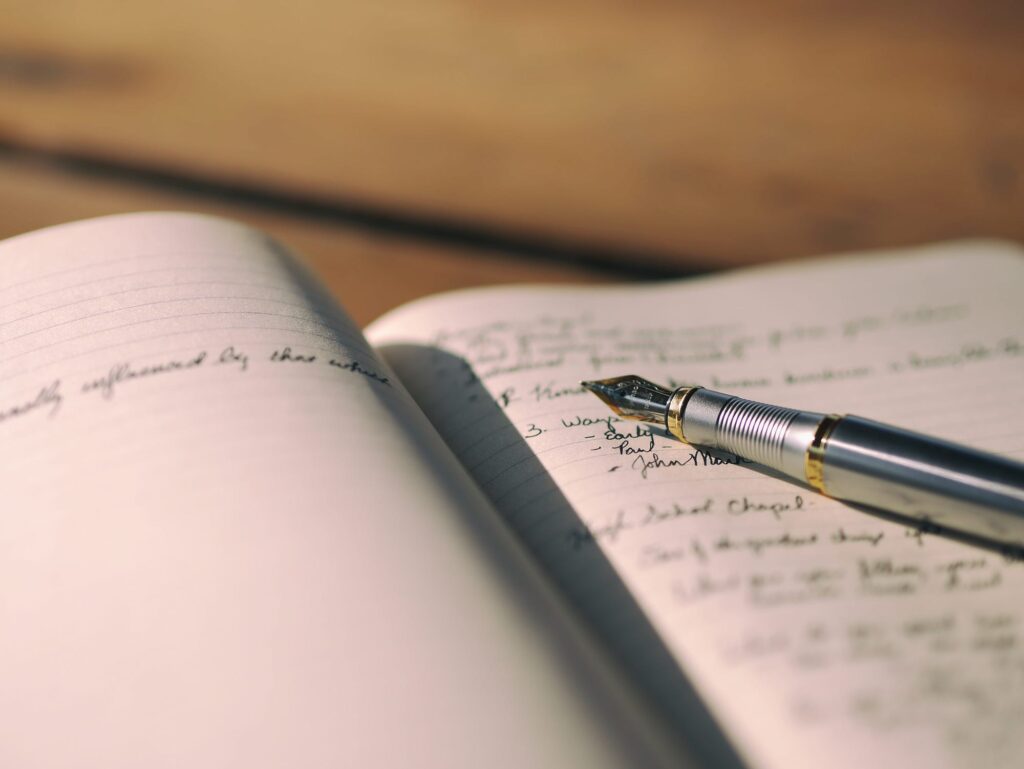Journaling involves reflecting on your life and putting those thoughts into writing. It is a straightforward practice that doesn’t require anything more. Despite its simplicity, the daily journal has been a significant tool in the lives of numerous successful individuals.
As you might expect, journaling is a favorite habit of many writers. From Mark Twain to Virginia Woolf, Francis Bacon to Joan Didion, John Cheever to Vladimir Nabokov. A journal was rarely far from any of these artists. Susan Sontag once claimed that her journal was where she “created herself.”
Journaling has been utilized by scores of brilliant thinkers and inventors. Charles Darwin. Marie Curie. Leonardo da Vinci. Thomas Edison. Albert Einstein. Similarly, leaders and politicians throughout history have kept journals in one form or another. People like George Washington, Winston Churchill, and Marcus Aurelius.In the sporting world, athletes like Katie Ledecky, winner of multiple gold medals, and Eliud Kipchoge, the world record holder in the marathon, rely on journals to reflect on their daily workouts and improve their training.
Why have so many of history’s greatest thinkers spent time journaling? What are the benefits?
Also Read: Argentina chooses right-wing libertarian Javier Milei as its next president
What Journaling Can Do for You
Nearly anyone can benefit from getting their thoughts out of their head and onto paper. There are more benefits to journaling than I have time to cover here, but allow me to point out a few of my favorites.
Journaling provides the opportunity to learn new lessons from old experiences. When looking back on her previous journal entries, Virginia Woolf remarked that she often “found the significance to lie where I never saw it at the time.”
Reading your old journal entries is a bit like reading a great book for a second time. You pick up on new sentences and see the past differently. Only this time, you are re-reading the story of your life.
Journaling sharpens your memory. When Cheryl Strayed wrote her hit book, Wild, she relied heavily on her journal. She recalled, “My journal provided the who, what, how, when, and why with a specificity that memory might have blurred, but it also did something more: it offered me a frank and unvarnished portrait of myself at 26 that I couldn’t have found anywhere else.”
Time will change your face without you noticing, but it will also change your thoughts without you realizing it. Our beliefs shift slowly as we gain experience and journal entries can freeze your thoughts in time. Seeing an old picture of yourself can be interesting because it reminds you of what you looked like, but reading an old journal entry can be even more surprising because it reminds you of how you thought.
Journaling motivates you to make the most of each day. There is something about knowing that your day will be recorded that makes you want to make at least one good choice before the sun sets. I will sometimes find myself thinking, “I want to have something good to write down tonight.”
Journaling provides proof of your progress. Writing down one sentence about what went well today gives you something powerful to look at when you’re feeling down. When you have a bad day, it can be easy to forget how much progress you have made. But with a journal, it’s easier to keep a sense of perspective. One glance at your previous entries and you have proof of how much you have grown over the months and years.
Many people like the idea of journaling, but few people stick with the act of journaling. It sounds great in theory, but making it a habit is another matter.

How to Make Journaling Easy
Here’s the truth: There’s no one “right” way to journal. You can do it wherever you want and in whatever way you want. All you need is a piece of paper or a blank document. However, although there is no right way to journal, there is an easy way to journal…
Write one sentence per day.
The primary advantage of journaling one sentence each day is that it makes journaling fun. It’s easy to do. It’s easy to feel successful. And if you feel good each time you finish journaling, then you’ll keep coming back to it.
A habit does not have to be impressive for it to be useful.
Make Your Journaling Easy
Each Habit Journal is crafted to simplify the daily journaling process. It commences with a section named “One Line Per Day.”
At the top of each One Line Per Day page is space for a journaling prompt. Here are a few examples of journaling prompts you could use:
- What happened today? (Daily journal)
- What am I grateful for today? (Gratitude journal)
- What is my most important task today? (Productivity journal)
- How did I sleep last night? (Sleep journal)
- How do I feel today? (Mood journal)
Underneath the prompt are 31 lines. One line for each day of the month. This is where you’ll write your one sentence each day.
To start your journaling habit all you have to do is write your prompt for the month and jot down a few words each day. Once the month is complete, you can look back on 31 beautiful journal entries. The entire experience is designed to make journaling so easy that you can’t help but do it each day.
Also Read: Celebrating the Brightest Stars: World Children’s Day











More Stories
Why Today’s Border States Mock Drills Were Postponed
Elon Musk Exits Trump Government: ‘My Time Comes To An End’
पाचन को मजबूत और गट को हेल्दी रखने के लिए अपनाएं ये आदतें, बीमारियों से लंबे समय तक दूर रहेंगे